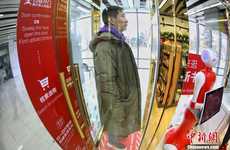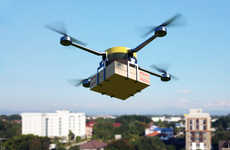
China's JD.com Plans to Launch Hundreds of Unmanned Stores
Laura McQuarrie — December 22, 2017 — Business
After conducting a test with 10,000 employees at its headquarters in Beijina, Chinese web retailer JD.com is planning to open hundreds of unmanned stores.
In place of staff, the stores will rely heavily on technology, such as cameras and facial recognition technology, which will be used to eliminate checkout lines, as well as provide custom promotions and advertisements. Heat maps will be used to monitor the flow of activity within a space, making it easier on the operators to efficiently stock products based on customer preferences.
In the future, JD.com has plans to license the technology it has developed to other third-party retailers. As Song Ma, the vice president of JD.com describes: "From helping small stores' owners streamline their supply chains and increase stocking efficiency, to speeding up check out, this is a massive jump beyond anything in use today." Outside of the retail store, the online retailer also has plans to implement autonomous vehicles for home deliveries.
In place of staff, the stores will rely heavily on technology, such as cameras and facial recognition technology, which will be used to eliminate checkout lines, as well as provide custom promotions and advertisements. Heat maps will be used to monitor the flow of activity within a space, making it easier on the operators to efficiently stock products based on customer preferences.
In the future, JD.com has plans to license the technology it has developed to other third-party retailers. As Song Ma, the vice president of JD.com describes: "From helping small stores' owners streamline their supply chains and increase stocking efficiency, to speeding up check out, this is a massive jump beyond anything in use today." Outside of the retail store, the online retailer also has plans to implement autonomous vehicles for home deliveries.
Trend Themes
1. Unmanned Stores - The rise of unmanned stores presents an opportunity for technology companies to develop advanced systems for inventory management and customer engagement.
2. Facial Recognition Technology - The use of facial recognition technology in retail settings opens up possibilities for companies to create personalized shopping experiences and targeted marketing campaigns.
3. Autonomous Vehicles for Deliveries - The adoption of autonomous vehicles for home deliveries creates a new market for companies to develop innovative solutions for efficient and secure transportation.
Industry Implications
1. Technology - The technology industry has the opportunity to develop and provide cutting-edge solutions for unmanned stores, facial recognition systems, and autonomous vehicles.
2. Retail - The retail industry can embrace unmanned stores and incorporate the latest technology to create seamless and efficient shopping experiences for customers.
3. Logistics - The logistics industry can leverage autonomous vehicles for deliveries to optimize last-mile transportation and enhance overall supply chain operations.
5.1
Score
Popularity
Activity
Freshness























